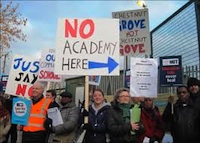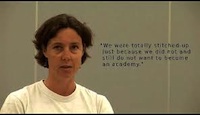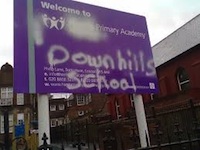The tale of a north London primary school which stood up to Michael Gove’s forced academy programme has been captured in a powerful new documentary. MATTHEW BROWN reports.
In September 2011, pupils and teachers returned to Downhills Primary in Haringey, north London, for the start of a new school year full of hope and optimism about the school’s future.
The school – a typical inner city primary with a hugely mixed intake reflecting its surrounding community – had recently dragged itself up the ladder from ‘special measures’ to ‘good’ on Ofsted’s dreaded hierarchy of abstract judgments. It was, by anyone’s reckoning – including the local authority’s and the education inspectorate’s – an ‘improving school’.
 Not surprisingly, then, when parents were asked whether they wanted Downhills to become an academy more than 90 per cent said ‘no’. Downhills was a community school, and the community liked it that way.
Not surprisingly, then, when parents were asked whether they wanted Downhills to become an academy more than 90 per cent said ‘no’. Downhills was a community school, and the community liked it that way.
What happened next is a tale of central government bullying and local authority complicity, of right-wing ideology trumping educational experience and evidence, and of private sector power triumphing over local democracy and a community’s wishes.
It is a story that exposes the Tory-led government’s claims about boosting parental choice and devolving power to local people as a smokescreen for the marketisation of public services, a process by which private sector companies, disguised as charities, are not only taking over schools, but positioning themselves to substitute for local education authorities themselves.
This is the sharp end of Michael Gove’s neo-liberal revolution in state education, a radical reform process every bit as damaging to ideals of collective provision and accountability, to notions of the common good, as Andrew Lansley’s hated health reforms. Yet it has been far less widely reported or understood and, so far, much less fiercely opposed, not least by Labour’s front bench and its shadow minister Stephen Twigg.
At Downhills, the opposition was fierce, and the school’s resistance to “forced academisation” has been reported, most comprehensively in a powerful new documentary by education film-maker Rhonda Evans launched at the Institute of Education in London on 13 February and available to watch online.
Turbulent year
Called ‘The Parents, the Politician and the Carpetbagger’, it shows what happened when Downhills parents voted against an academy takeover; how Gove asked the new head of Ofsted, Sir Michael Wilshaw – a former academy headteacher – to send his inspectors back to the school within six months to revise their assessment; of how the school dropped from ‘good’ to ‘failing’ with a few strokes of their pointed pens; and how the parents, governors, pupils and staff fought an ultimately unsuccessful battle to stop the school being turned into the latest branch of Carpet Rite-owner and Tory party donor Lord Harris’s academy chain.
Evans’ film follows the Downhills campaign through a turbulent year in which the headteacher, Leslie Church, was forced to resign, and the entire governing board summarily sacked by Gove to be replaced by a five-person interim executive board, two of the five places filled by Harris personnel.
It examines Gove’s dismissal of the parents as “Trots” in an “SWP-backed campaign”, and finds instead people like Pat Berryman, a City financier and Haringey resident who had given up his free time to be a Downhills governor, providing football coaching to pupils on Thursday evenings.
Berryman was a man who knew “full well” from his inside experience of the financial crisis that “the market does not have all the answers”. Gove, he says, is “naïve” about business, motivated by “manic certainty”, and “as scary as I can remember”.
The film looks at the government’s claims that academies outperform maintained schools and finds them fiddling the figures. It reports on the work of Henry Stewart, a school governor in nearby Hackney, who looked at the data and discovered that most under-performing schools of all kinds across the country are doing better, but that the government only counts the academies, not the rest.
Evans goes to Western Springs primary in Staffordshire too, where headteacher Shirley Wellings had also steered her school from special measures to good, exceeding the Department for Education’s ‘floor targets’ for SATs results, only to find itself on Gove’s academy hit list. Like parents at Downhills, Wellings realised that her own LEA was doing the minister’s dirty work, putting pressure on the school to join an academy chain run by a private company, in its case the Creative Education Trust.
In the end, Western Springs avoided academy status only by becoming a co-operative-sponsored trust school, outside the LEA’s remit. At Downhills, the campaigners wanted their school to remain part of local democratic structures.
They won a public consultation, although not one held on their terms. Rather than a public meeting, an open airing of views, small, hand-picked groups of parents were instructed to attend closed discussions at allotted times with the new board where they were always outnumbered by Harris representatives and DfE officers.
The campaigners, by now well organised and unrepentantly vocal, recorded the meetings, capturing on tape one of the board members admitting that “parents are allowed an opinion but not a choice”. Afterwards they laughed ironically at being sold the Harris mantra of “mentoring, modelling and coaching” – “as if that’s all it takes to improve education”; “as if we don’t do all that anyway”.
In revenge for their school’s takeover, the parents occupied a local branch of Carpet Rite and held a mock lesson with their children in the middle of one of Lord Harris’s cavernous shops. Downhills staff called a one-day strike, with full parental backing. And the campaign went legal, eventually taking to the High Court last August in pursuit of a judicial review of Gove’s edict.
They lost. And by September 2012 Downhills school sported a new sign declaring that it was now a ‘Harris Primary Academy’.
Ignorance and misconceptions
According to campaigning parent Sarah Williams, the school immediately lost five outstanding teachers and many parents moved their children out. Where once there was a real sense of togetherness, including an award-winning Parent Teachers’ Association, relations are now strained, the school “a basket case”, she says.
At the film’s launch, one London teacher of 30 years experience pointed out the uniqueness of Williams and her co-campaigners at Downhills. “Most parents do not understand what’s going on in education, and most teachers don’t either,” she said. “The 2010 Academy Act bypassed most parents, and most other school stakeholders too.”
It was this sense of widespread ignorance about Gove’s reforms that motivated Evans to make the film.
“I just wanted a debate about it,” she says. “When the health reforms were going through there was a lot of talk about it, but no one seems to be talking about education, least of all the front bench of the Labour Party.
“I despair of how ignorant we all are. People are frightened to speak about education so parents are generally, hugely misinformed. Misconceptions about state education are widespread and fuelled by certain interests.
“Downhills parents were fairly radical, and untypical, in that they were not just interested in their own child, but in the wider issues.”
In Evans’ film those misconceptions are challenged by Ben Levin of the University of Toronto’s Institute of Education. Levin, a professor in education leadership and policy, argues that the government is simply wrong to claim that increased competition between ‘autonomous’ schools will improve school performance, let alone lead to a better education for children.
“It’s the wrong way of thinking about it,” he says. “There is evidence from many places across the world that changing the organisational structure does not change performance. Societies have to talk about every school improving as a collective, collegiate responsibility.”
For decades, local education authorities have provided the “collective, collegiate” structures on which primary and secondary education has depended. These have rarely been perfect, and no doubt often bureaucratic, yet they are part of a middle tier of democracy that the current government is quietly replacing with privately-led chains of schools.
One of the myths of state education, as Levin points out, is that educators are prevented from doing what they need to by state bureaucracy. The result of the current drive for autonomy, he says, is that England increasingly “doesn’t have a system, just schools”.
Political agenda
At one of their meetings with Haringey’s education leaders the Downhills campaigners discovered that their LEA had been bullied by central government to offer up two primaries to become feeder schools for a Harris secondary. The school’s performance hardly mattered, let alone the wishes of its parents.
As one parent said: “This is a political agenda to break local authority control. The forced academisation of primaries is about allowing private companies to become their own LEAs.”
She tells the compliant council leaders: “You’ve put the local authority in such a weak position there will no LEA in a few years’ time.”
Indeed, it is already shrinking, fuelled in part by council cuts. Just a year after the riots which started in the borough, Haringey has got rid of most of its school improvement officers.
It is a depressing scenario, but though the Downhills campaigners lost their battle, their spirit of resistance survives elsewhere. After the screening, people spoke of other schools in other areas – Hammersmith, Salisbury, Brent – where communities are opposing the forced academy agenda, taking lessons from the Downhills experience.
These are local, community campaigns, just the sort of grassroots, self-organised initiatives that David Cameron’s ‘big society’ was meant to be about, and Ed Miliband’s ‘one nation’ Labour Party claims to be interested in.
Yet they have precious little political support, and seemingly none at all at national level. As Evans says: “There is a desperate vacuum of political opposition to what’s happening. It has been shameful the lack of interest from Labour.”
Her film is now being shown around the country, and will be screened at a fringe meeting at this year’s Labour Party conference. We can only hope Mr Twigg takes notice.
—-
Rhonda Evans’ film, ‘The Parents, the Politician and the Carpetbagger: Academies and lies’, can be viewed online at www.academiesandlies.org.uk where you can also find more information about the film, and a trailer.
Also see: Are Co-operative Schools the Answer?



8 July 2013
[…] also ‘Academies and Lies’ and ‘Are Co-operative Schools the Answer?’ Tags: Campaigns, Con Dems, Education, Trade […]